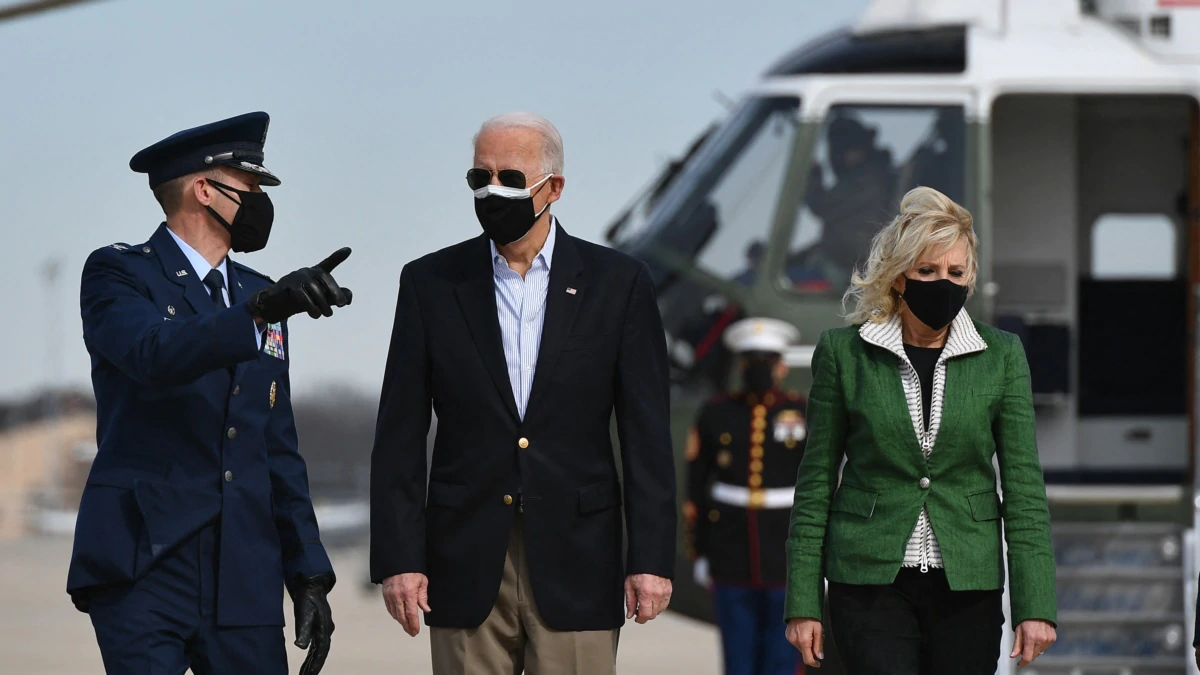
U.S. President Joe Biden says the air strike against an Iran-backed militia in eastern Syria should be seen by Tehran as a warning against any further aggressive actions.
“You can’t act with impunity,” he told reporters on February 26 when asked what the message was from the air strikes announced a day earlier.
“Be careful,” he added during a stop in Houston as part of a tour to inspect relief efforts in the storm-ravaged state of Texas.
The U.S. Defense Department on February 25 announced the air strikes in response to rocket attacks earlier this month on an Iraqi base housing U.S. and coalition troops, saying they sent “an unambiguous message [that] President Biden will act to protect American and coalition personnel.”
The Pentagon said two F-15E warplanes dropped seven precision-guided munitions on sites in eastern Syria used by the militias believed to be behind the rocket attacks on U.S. and other troops.
The Pentagon said the strikes, the first military action undertaken by Biden’s administration since he was sworn into office last month, hit “multiple facilities” at a control point on the Syria-Iraq border used by several Iran-backed militias, including the Iraqi Shi’ite groups Kaitib Hizballah and Kaitib Sayyid al-Shuhada.
“This location is known to facilitate Iranian-aligned militia group activity,” spokesman John Kirby said, describing the site as a “compound” that previously had been used by the Islamic State (IS) terror group when it controlled the area.
The Syrian Observatory for Human Rights, a war monitor, said 17 members of the Popular Mobilization Units (PMU) were killed after the strike hit three trucks loaded with munitions coming from Iraq.
The PMU is an umbrella paramilitary force composed of a number of mostly Shi’ite Iraqi militia groups.
Tehran condemned the attack, saying it would further destabilize the region. The Foreign Ministry called the action “illegal attacks” in “clear violation of human rights and international law.”
Damascus labeled it “cowardly American aggression.”
“It is a bad sign regarding the policies of the new U.S. administration which should adhere to international [norms],” the Syrian Foreign Ministry said.
Russia, a key Syrian ally, also condemned the attack, saying its troops stationed in Syria were given little advanced warning.
Foreign Minister Sergei Lavrov said the action called into question the U.S. administration’s plans in Syria.
“It is very important for us to understand the United States’ strategic line on the ground,” Lavrov said.
Pentagon spokesman John Kirby responded to Lavrov’s criticism that Moscow had been notified just a few minutes before the U.S. attack.
“We did what we believe was the proper amount of notification for this,” he said. “It shouldn’t come as a shock to anybody that we’re going to do what we have to do to notify, but we’re also going to do what we have to do to protect our forces.”
Along with Russia, Iran has provided crucial military support to Syrian President Bashar al-Assad during Syria’s civil war, which began with a crackdown on anti-government protesters in March 2011. More than 400,000 people have since been killed and millions displaced.
The U.S. military has also been active in Syria in support of a coalition of Syrian Arab and Kurdish opponents of Assad.
The strikes came after three recent rocket attacks. A February 15 rocket salvo on a military base at Irbil International Airport in the capital in Iraq’s semi-autonomous Kurdistan region killed one civilian contractor and wounded a U.S. service member and other coalition troops.
Another rocket attack on a base hosting U.S. forces north of Baghdad days later hurt at least one contractor. Yet another rocket barrage targeted the U.S. Embassy in Baghdad earlier this week.
A little-known Shi’ite militant group calling itself the Guardians of Blood Brigade claimed responsibility for the attack in Irbil. Some experts say Kaitib Hizballah has used separate militant cells as a cover to absolve itself of responsibility for attacks on U.S. forces.